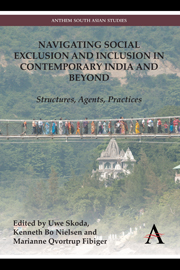 Navigating Social Exclusion and Inclusion in Contemporary India and Beyond
Navigating Social Exclusion and Inclusion in Contemporary India and Beyond from Part III - Resources and Development
Published online by Cambridge University Press: 05 September 2013
It was a simmering hot summer day and Rosalyn, my research assistant, and I were standing together with Shankar and a number of fellow ‘Pradhans’ (name of a Scheduled Tribe (ST)) in the middle of an archetypical village scene with the clay houses so typical of small villages in rural Odisha; and yet, we were in the middle of the state capital of Bhubaneswar in one of the resettlement colonies that had grown as rural–urban migration took off in the latter half of the twentieth century. We discussed Shankar's tuberculosis (TB) and his continuous inability to follow the new TB treatment that had recently been introduced in the capital. Because he did not turn up at the clinic to get his medicines according to the schedule, the doctor had stopped his treatment. Now he had a fever, but he insisted that it was caused by the rain. I offered to accompany him to see the doctor on the following day – just before I had to leave India for a longer stretch of time – to help ensure that he was put back on treatment, and the small crowd of concerned family and friends surrounding this public discussion strongly supported the idea. But Shankar did not. I said, ‘It's your decision; it's your life, if you want me to help you, I'll go with you on Monday morning, but if you don't want it, I can't help you.’
To save this book to your Kindle, first ensure [email protected] is added to your Approved Personal Document E-mail List under your Personal Document Settings on the Manage Your Content and Devices page of your Amazon account. Then enter the ‘name’ part of your Kindle email address below. Find out more about saving to your Kindle.
Note you can select to save to either the @free.kindle.com or @kindle.com variations. ‘@free.kindle.com’ emails are free but can only be saved to your device when it is connected to wi-fi. ‘@kindle.com’ emails can be delivered even when you are not connected to wi-fi, but note that service fees apply.
Find out more about the Kindle Personal Document Service.
To save content items to your account, please confirm that you agree to abide by our usage policies. If this is the first time you use this feature, you will be asked to authorise Cambridge Core to connect with your account. Find out more about saving content to Dropbox.
To save content items to your account, please confirm that you agree to abide by our usage policies. If this is the first time you use this feature, you will be asked to authorise Cambridge Core to connect with your account. Find out more about saving content to Google Drive.